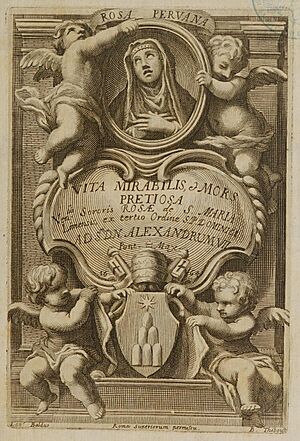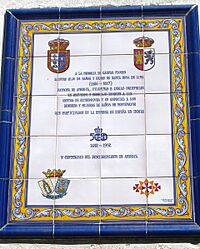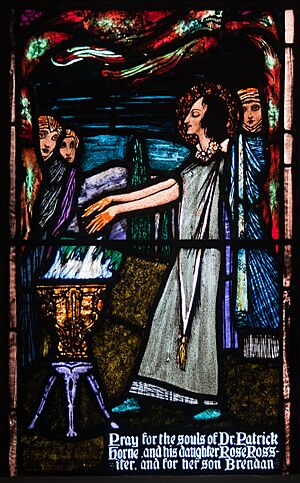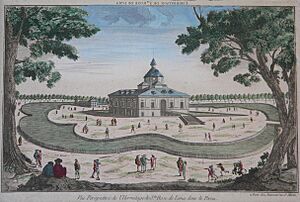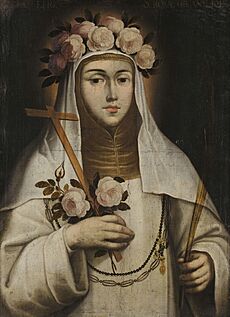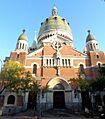Rose of Lima facts for kids
Quick facts for kids SaintRose of Lima TOSD |
|
|---|---|
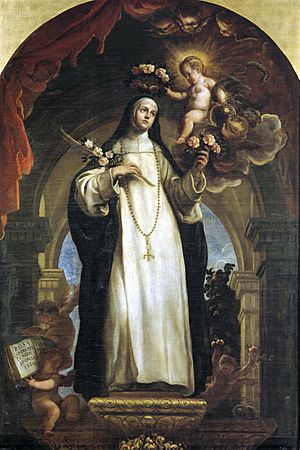
Saint Rose of Lima by Claudio Coello (1642–1693), in the Prado Museum, Madrid, Spain
|
|
| Virgin | |
| Born | Isabel Flores de Oliva April 20, 1586 Lima, Viceroyalty of Peru |
| Died | August 24, 1617 (aged 31) Lima, Viceroyalty of Peru |
| Venerated in | Catholic Church |
| Beatified | April 15, 1667 or 1668, Rome, Papal States by Pope Clement IX |
| Canonized | April 12, 1671, Rome, Papal States by Pope Clement X |
| Major shrine | Basilica of Santo Domingo Lima, Peru |
| Feast | August 23 August 30 (some Latin American countries and pre-1970 General Roman Calendar) |
| Attributes | Dominican tertiaries' habit, roses, anchor, Infant Jesus |
| Patronage | embroiderers; sewing lace; gardeners; florists; people ridiculed or misunderstood for their piety; for the resolution of family quarrels; against vanity; indigenous peoples of the Americas; Latin America; Peru; Philippines; the Indies; Villareal; Santa Rosa, California; Santa Rosa, Laguna; Santa Rosa, Nueva Ecija; Alcoy, Cebu; Daanbantayan, Cebu; Arima, Trinidad and Tobago; Lima; Sittard |
Rose of Lima (born Isabel Flores de Oliva; April 20, 1586 – August 24, 1617) was a very special person from Lima, Peru. She was part of the Third Order of Saint Dominic, a group of people who follow the rules of the Dominican Order but live in their own homes. Rose was known for her strong faith and for helping people who were poor and sick in her city.
She came from a noble family and is now a patron saint of things like embroidery, gardening, and flowers. The Catholic Church declared her a saint, making her the very first person born in the Americas to receive this honor. Rose of Lima is an important figure in Latin America, especially in Peru, where her picture is even on the country's highest money bill.
Contents
Early Life of Saint Rose
Isabel Flores de Oliva was born in Lima, Peru, on April 20, 1586. At that time, Peru was part of the Viceroyalty of Peru, ruled by Spain. She was one of eleven children. Her father, Gaspar Flores, was a soldier from Spain, and her mother, María de Oliva y Herrera, was born in Lima.
When Isabel was a baby, a servant said her face changed into a rose. Because of this, she was given the nickname "Rose." In 1597, when she was 11, she was confirmed by the Archbishop of Lima, Toribio de Mogrovejo, who also later became a saint. At this time, she officially took the name Rose.
Rose's Dedication and Help for Others
From a young age, Rose wanted to live a life dedicated to God. She looked up to Catherine of Siena, another famous Dominican. Rose began to fast often and did many acts of self-discipline in secret.
People noticed her beauty, but Rose did not want attention for her looks. She even cut her hair and put peppers on her face to make herself less attractive. She turned down all offers of marriage, even though her parents wanted her to marry. Rose spent many hours praying and thinking about the Blessed Sacrament. This was very unusual for her time. She promised to remain unmarried, which her parents did not like. Eventually, her father gave her a private room in their home.
Besides fasting, Rose stopped eating meat completely. She cared for the sick and hungry people in her community. She would bring them to her room and look after them. To help her family, Rose sold her beautiful needlework and flowers she grew. She made and sold lace and embroidery to earn money for the poor. She also prayed and practiced self-discipline in a small cave she built in her garden. She rarely left her room, except to go to church.
Becoming a Tertiary
The Dominican Order friars noticed Rose's strong faith. She wanted to become a nun, but her father would not allow it. So, she joined the Third Order of St. Dominic instead. This meant she could follow the Dominican rules while still living at home with her parents. When she was 20, she officially became a tertiary and promised to remain unmarried forever.
Rose allowed herself to sleep only two hours a night so she could spend more time praying. She wore a heavy silver crown with small spikes inside. She did this to remember the Crown of Thorns that Jesus Christ wore.
Rose lived this way for eleven years. She passed away on August 24, 1617, at the young age of 31, after being sick for a long time. It is said that she knew the exact date she would die. Many important people in Lima attended her funeral. Her feast day is celebrated on August 23rd in most places.
Honoring Saint Rose
Rose was declared "blessed" by Pope Clement IX in 1667. Then, on April 12, 1671, Pope Clement X declared her a saint. She was the first Catholic person born in the Americas to become a saint.
Today, you can visit her shrine in Lima, Peru, inside the Basilica of Santo Domingo. Her friends, Martin de Porres and John Macias, are also honored there. Many amazing things are said to have happened after her death. People claimed she cured a person with leprosy. It is also said that the city of Lima smelled like roses, and roses fell from the sky when she died. Many places in the Americas are named Santa Rosa after her.
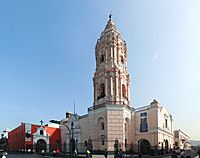
Her special day in the church calendar was first set for August 30th in 1729. This was because August 24th, the day she died, was already the feast day of another saint. Later, in 1969, Pope Paul VI changed her feast day to August 23rd. This is when it is celebrated around the world, including in Spain. However, in Peru and some other Latin American countries, August 30th is still a public holiday in her honor.
There is a park named after her in downtown Sacramento, California. Also, in Trinidad and Tobago, the Santa Rosa Carib Community is named after her. The second oldest church in Port of Spain is also called Santa Rosa Church.
In Saint Lucia, a Caribbean island, there are two flower festivals. One is for the "Roses," and their big celebration is on Saint Rose of Lima's feast day, August 30th.
Saint Rose's skull, decorated with a crown of roses, is on display at the Basilica in Lima, Peru. It was a tradition to keep the body in the basilica and send the head around the country.
Patronage of Saint Rose
Saint Rose is the patroness of the Americas, the native people of the Americas, and of Peru. She is especially important to the city of Lima. She is also a patron saint for Sittard in the Netherlands, the Philippines, and the Indies.
Saint Rose's Legacy
Many places celebrate Saint Rose. For example, the Fiesta de Santa Rosa is held in Dixon, New Mexico, and the Sint Rosa Festival takes place in Sittard, Limburg, Netherlands, on the last weekend of August. In Sibbe, Netherlands, a special maypole is put up for Saint Rose.
The largest church dedicated to Saint Rose in the United States is in Maywood, California. Many other churches and parishes around the world are also named after her.
Churches and Parishes Named After Saint Rose
- Asia:
* Cherai, Kerala, India * Anayan, Pili, Camarines Sur, Philippines * Bagong Ilog and Sumilang, Pasig, Philippines * Santa Rosa City, Laguna, Philippines * Santa Rosa, Nueva Ecija, Philippines * Santa Rosa de Lima, Alcoy, Cebu, Philippines * Santa Rosa de Lima, Daanbantayan, Cebu, Philippines * St. Rose of Lima, Teresa, Rizal, Philippines
- Australia:
* Kapunda, South Australia, Australia * Collaroy Plateau, New South Wales, Australia * Rosedale, Victoria, Australia
- Europe:
* Sittard, Limburg, Netherlands * Sibbe - IJzeren, Limburg, Netherlands * Weoley Castle, Birmingham, UK
- North America:
* Acadian Peninsula, New Brunswick, Canada * Toronto, Ontario, Canada * Sooke, British Columbia, Canada * Sainte Rose du Lac, Manitoba, Canada * Santa Rosa de Juarez, Oaxaca, Mexico * Safford, Arizona, United States * Chula Vista, California, United States * Crockett, California, United States * Maywood, California, United States * Paso Robles, California, United States * Roseville, California, United States * Santa Rosa, California, United States * Simi Valley, California, United States * Buena Vista, Colorado, United States * Meriden, Connecticut, United States * New Haven, Connecticut, United States (Closed 2022) * Newtown, Connecticut, United States * Milton, Florida, United States * Miami Shores, Florida, United States * Montrose, Illinois, United States * Quincy, Illinois, United States * Franklin, Indiana, United States * Denison, Iowa, United States * Great Bend, Kansas, United States * Cloverport, Kentucky, United States * Springfield, Kentucky, United States * Jay, Maine, United States * Baltimore, Maryland, United States * Gaithersburg, Maryland, United States * Chelsea, Massachusetts, United States * Chicopee, Massachusetts, United States * Northborough, Massachusetts, United States * Topsfield, Massachusetts, United States * Hastings, Michigan, United States * Roseville, Minnesota, United States * De Soto, Missouri, United States * Dillon, Montana, United States * Reno, Nevada, United States * Littleton, New Hampshire, United States * Belmar, New Jersey, United States * East Hanover, New Jersey, United States * Haddon Heights, New Jersey, United States * Freehold, New Jersey, United States * Short Hills, New Jersey, United States * Forestville, New York, United States * Lima, New York, United States * Massapequa, New York, United States * New York, New York, United States * North Syracuse, New York, United States * Rockaway Beach, Queens, New York, United States * Hillsboro, North Dakota, United States * Perry, Oklahoma, United States * Cincinnati, Ohio, United States * St. Rose, Ohio, United States * Perrysburg, Ohio, United States * Lima, Ohio, United States * Altoona, Pennsylvania, United States * Carbondale, Pennsylvania, United States * Eddystone, Pennsylvania, United States * Dillon, Montana, United States * North Wales, Pennsylvania, United States * York, Pennsylvania, United States * Murfreesboro, Tennessee, United States * Andice, Texas, United States * Houston, Texas, United States * San Antonio, Texas, United States * Layton, Utah, United States * Cheney, Washington, United States * Cuba City, Wisconsin, United States * Milwaukee, Wisconsin, USA * Benavides, Texas, United States * Bay St Louis, Mississippi
- South America:
* Basilica Santuario de Santa Rosa de Lima Buenos Aires, Argentina * Santa Rosa Church, Paramaribo, Suriname. * Arima, Trinidad and Tobago * Lima, Perú
- Central America and Caribbean:
* Rincón, Puerto Rico, United States * Venus Gardens, San Juan, Puerto Rico, United States * Ranchuelo, Villa Clara, Cuba * Santa Rosa, Colón, Panamá
Images for kids
-
Temple, Sanctuary and Convent where she lived in Lima
See also
 In Spanish: Rosa de Lima para niños
In Spanish: Rosa de Lima para niños
- List of Catholic saints
 | Victor J. Glover |
 | Yvonne Cagle |
 | Jeanette Epps |
 | Bernard A. Harris Jr. |


